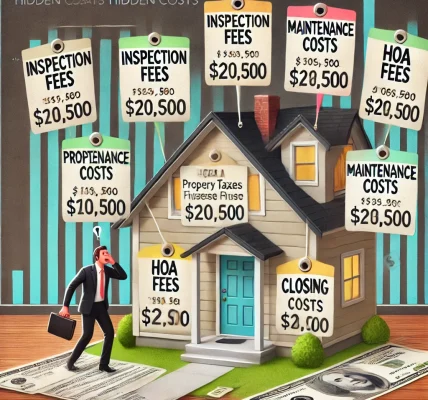Introduction
Investing in real estate is not just about generating rental income or capital appreciation; it also offers significant tax benefits that can help investors maximize their returns. The key to successful real estate investing is understanding and leveraging these tax advantages legally and efficiently. In 2025, technological advancements have further simplified tax planning, allowing investors to automate deductions, track expenses, and optimize their tax strategies.
In this guide, we will explore various tax benefits available to real estate investors, how technology is revolutionizing tax planning, and provide a step-by-step approach to maximizing these benefits while staying compliant with the law.
1. Key Tax Benefits for Real Estate Investors
1.1. Depreciation Deductions
Depreciation allows real estate investors to deduct the cost of their property over time. The IRS considers rental properties to have a useful life of 27.5 years for residential and 39 years for commercial properties.
- Example: If you purchase a rental property for $275,000 (excluding land value), you can deduct $10,000 annually for depreciation.
1.2. Mortgage Interest Deductions
Interest paid on loans used to acquire or improve rental properties is tax-deductible. This significantly reduces taxable income for real estate investors.
- Tip: Maintain clear records of mortgage payments to maximize this deduction.
1.3. Property Tax Deductions
Property taxes paid on investment properties are deductible, helping investors reduce their taxable income.
1.4. 1031 Exchange (Capital Gains Deferral)
A 1031 exchange allows investors to defer capital gains taxes when selling a property and reinvesting the proceeds into a similar or “like-kind” property.
- Caution: Strict timelines and rules apply; seek professional guidance.
1.5. Deducting Property Management and Maintenance Costs
Investors can deduct expenses related to property management, repairs, and routine maintenance.
- Eligible expenses: Landscaping, plumbing repairs, pest control, and HVAC servicing.
1.6. Pass-Through Tax Deduction (Qualified Business Income – QBI)
Real estate investors operating through pass-through entities (LLCs, S-Corps) may qualify for a 20% deduction on qualified business income under the IRS tax code.
1.7. Travel and Transportation Deductions
If you travel for property management or investor meetings, those expenses (mileage, airfare, lodging) may be tax-deductible.
- Tip: Use digital tools to track travel expenses.
2. How Technology is Changing Real Estate Tax Planning
2.1. AI-Powered Tax Software
AI-driven platforms, such as TurboTax and H&R Block, automate tax calculations and identify potential deductions, making tax filing easier for real estate investors.
2.2. Blockchain for Secure Transactions
Blockchain ensures transparency and security in real estate transactions, reducing the risk of tax fraud and errors in financial records.
2.3. Smart Expense Tracking Apps
Apps like QuickBooks, Stessa, and Expensify help investors track income and expenses in real-time, categorizing them for accurate tax reporting.
2.4. Virtual Tax Consultations
Online tax professionals offer virtual consultations using AI-driven platforms, providing tailored tax-saving strategies.
2.5. Digital 1031 Exchange Platforms
Some platforms automate the 1031 exchange process, ensuring compliance with IRS regulations while making reinvestment seamless.
3. Step-by-Step Guide to Maximizing Real Estate Tax Benefits
Step 1: Structure Your Investment Properly
- Choose the right business entity (LLC, S-Corp, or Sole Proprietorship) for tax benefits.
- Consult with a tax professional to determine the best structure for liability protection and tax savings.
Step 2: Keep Accurate Financial Records
- Use digital tools to track rental income, expenses, and depreciation.
- Separate personal and business expenses to avoid IRS scrutiny.
Step 3: Leverage Depreciation Deductions
- Ensure your property qualifies for depreciation.
- Calculate depreciation based on IRS guidelines.
Step 4: Take Advantage of 1031 Exchanges
- Plan property sales strategically to defer capital gains taxes.
- Identify a like-kind property within 45 days and close the deal within 180 days.
Step 5: Optimize Mortgage Interest and Property Tax Deductions
- Keep records of all mortgage payments and property tax receipts.
- Use AI-driven tax tools to calculate eligible deductions.
Step 6: Deduct Business-Related Expenses
- Maintain receipts for property management fees, maintenance costs, and legal fees.
- Use expense-tracking apps for easy documentation.
Step 7: Monitor Legislative Changes
- Stay updated on tax laws and government incentives for real estate investors.
- Subscribe to online tax forums and consult with professionals regularly.
4. Common Mistakes to Avoid in Real Estate Tax Planning
4.1. Mixing Personal and Business Finances
Always keep personal and investment property finances separate to avoid IRS complications.
4.2. Ignoring Depreciation Recapture Taxes
When selling a depreciated property, investors must pay depreciation recapture tax. Planning ahead can help minimize this burden.
4.3. Not Keeping Proper Documentation
Failure to maintain financial records can result in lost deductions and potential IRS audits.
4.4. Overlooking Passive Activity Loss Rules
Rental income is considered passive income, and losses may be limited unless you qualify as a real estate professional under IRS rules.
4.5. Misunderstanding 1031 Exchange Rules
Strict timelines and property type requirements must be met for a successful 1031 exchange.
5. Future Trends in Real Estate Taxation
5.1. Increased Use of AI and Big Data in Tax Planning
AI will continue to streamline tax calculations, reducing errors and maximizing deductions for investors.
5.2. Expansion of Blockchain for Secure Transactions
Blockchain technology will further enhance real estate record-keeping, reducing fraud and ensuring accurate financial documentation.
5.3. Government Incentives for Green Investments
Governments worldwide are offering tax breaks for sustainable building projects, encouraging eco-friendly investments.
5.4. Digital Tax Filing Becoming Standard
More tax authorities are adopting digital-first tax filing systems, making compliance easier for real estate investors.
Conclusion
Real estate investors can significantly enhance their profitability by leveraging tax benefits such as depreciation deductions, 1031 exchanges, mortgage interest deductions, and pass-through income benefits. With the rise of technology, tax planning has become more efficient, allowing investors to track expenses, automate deductions, and optimize their tax strategies.
By following a structured approach—keeping accurate financial records, utilizing tax software, and consulting professionals—investors can legally minimize their tax liabilities while maximizing their returns.




